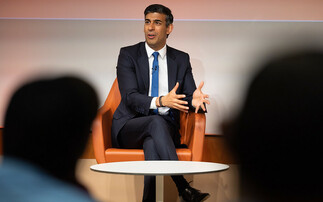The declaration of emergency is central to the stories we are told from childhood - calls for a climate emergency are not going away and the government needs to find a credible way to respond
There is something deeply culturally resonant and historically loaded in the declaration of an emergency. It is there in so many of the stories that are told to us from childhood, just as it is at the core of many of the historical narratives that sustain our sense of identity. It is the close of Act One, the spark that ignites the story, creating the space for the hero's quest, conflict, jeopardy, and resolution. From fairy tales to national origin myths, from political rhetoric to kids' cartoons, the recognition that we face a crisis is at the heart of so many of the stories that shape us.
For various parental reasons I am currently particularly well-versed in the last of these culture-shaping narratives: kids cartoons. It is fascinating to watch how so many of the pre-school shows pivot on the often literal sounding of an emergency alarm, prompting the protagonists to swing into action and stage their rescues. And it is always rescues. Mindful of the need to avoid the trauma of conflict and violence (a precaution kids TV producers evidently forget as soon as the target audience turns, I don't know, about four - yes, that's a whole other story), the crisis is typically a neutral accidental danger necessitating a brave, but carefully staged recovery. Fireman Sam, Paw Patrol, Octonauts, the alarm sounds, the heroes respond, salvation is secured. As a result, the first play-acting games my eldest son mastered were always accompanied by the faultlessly dramatic declaration, "Daddy, it's an emergency; let's do a rescue".
Perhaps this is why later in life the declaration of an emergency, alarming as it can be, often brings with it an instinctive sense of reassurance. In the wake of a crisis, be it a terrorist attack, riots, or an environmental threat, there is a deep rooted desire to hear of emergencies declared, colour coded alerts, and COBRA meetings - anything to assure us the people in charge have a handle on this; that brave men and women are on their way, battling to secure as peaceful a resolution as possible; that Fireman Sam and his real life colleagues embody values that extend far beyond a kids' TV show. Ronald Reagan may have got elected and reshaped Western values with his insistence that the most terrifying words in the English language were "I'm from the government and I'm here to help", but even libertarians welcome the fire brigade when their home is alight.
Consequently, is it any wonder that yesterday's Greenpeace poll shows nearly two thirds of the public think we are facing a 'climate emergency'? Is it at all surprising that Labour will attempt to appeal to this large and growing constituency by staging a Commons motion today calling for the formal declaration of a national climate emergency? Equally, is it that much of a shock that the government is reluctant to embrace said emergency? Perhaps, deep down, they fear this is an emergency that can't be solved, at least not quickly and easily. There is no Fireman Sam, he's not coming, it's just us.
It may be a non-binding opposition day debate, but Labour's motion and the wider push for a climate emergency declaration embodied by the Extinction Rebellion (XR) protests and now embraced by the official opposition, the Scottish and Welsh governments, and numerous local authorities could mark a significant turning point for UK climate politics.
Last week in a Commons debate on XR Energy and Clean Growth Minister Claire Perry ducked the calls for a climate emergency to be declared, instead issuing a heartfelt plea for the cross-party consensus on climate action to be maintained. "We've heard loud calls today that we should declare a climate emergency, and my answer to that is that we can say words all we like from the dispatch box but what counts is actions and what I would hope to set out is the many actions that we are taking that have enjoyed cross-party support," she said. "It is my fervent hope that we will continue to tackle this enormous crisis in that spirit going forward.
Challenged by the Greens' Caroline Lucas to sign up to some of the specific cross party measures that would support the declaration of a climate emergency and explain why the Prime Minister had declined to meet with school strikes campaigner Greta Thunberg, Perry argued that she "did not want to politicise diaries" as that would take us "down a rabbit hole of conflict that this situation does not need" and reiterated her warnings that if we fail to celebrate the decarbonisation efforts the UK has made to date we will struggle to encourage larger emitters to follow suit.
It remains to be seen precisely what will be included in Labour's climate emergency motion and whether or not the government will back it. But it seems unlikely Ministers will simply acquiesce to the calls for an emergency declaration, knowing that abstentions and limited attendance by MPs who are busy with an election campaign helps to delegitimise a non-binding opposition day debate. Expect the government to hint ever more heavily that it will back the CCC's recommendation for a long term net zero emission target and hope that the emotive calls for a climate emergency burn themselves out.
But while it is easy to understand why the government is so desperate to maintain the cross-party consensus on climate action that has held for much of the past decade, it is hard to see the gambit working for much longer. A nice healthy political consensus may help ensure more long term policy stability for businesses and investors, but the problem for Perry and the rest of the government's green wing is that the calls for co-operation increasingly sound like a plea to tow the line and help the government avoid antagonising the scientific illiterates and free market ideologues in its ranks. As Michael Gove reportedly told XR yesterday, more of his colleagues across government need to be convinced if he is to declare a climate emergency.
Consensus allows the government to take credit for successful climate action, share the blame for where it falls short, and sideline those internal critics who are indifferent or hostile to decarbonisation. But what, asks the opposition, are we getting in return? Inadequate policies that mean the UK is on track to miss its carbon targets and an increasingly agitated and highly motivated base that is demanding we do much more.
Perry may argue that politicising the Prime Minister's diary risks sparking a dangerous game of 'tit for tat', but the reality is that diaries are intensely political. They are the physical manifestation of political priorities and when the central accusation being levelled is that climate change is not being treated as a truly top priority then both non-attendance at cross party efforts to drive forward progress and the refusal to declare a climate emergency are both undeniably political. They may be symbolic issues when set against the nitty gritty of climate policy detail, but symbols matter.
That said the government's reticence in the face of calls for a climate emergency is understandable, not least because the enterprise is not exactly risk free.
Whitehall is intrinsically reluctant to set the precedent for declaring long term emergencies, knowing full well that the approach limits flexibility and could be easily abused by future administrations with more authoritarian tendencies. Equally, wilfully breaking the cross-party consensus on the pace of decarbonisation may challenge 'green Tories' to pick a side, but even when the choice is between scientific necessity and colleagues they disagree with about almost everything tribal ties are hard to break. There is a real risk that in attacking the government so vociferously for their perceived inaction Labour sparks a backlash that results in the next Prime Minister declaring war on the 'green crap'.
This week's column from The Sun's political doyen Trevor Kavanagh may have highlighted the utter paucity and near incoherence of the arguments now being tossed around by fracking boosters and climate sceptics, but it also gives an insight into the pressures Conservatives who are committed to climate action still face and highlights how the party will always struggle to outflank the opposition on environmental issues.
And then there is the practical challenge of living up to the emergency once it is declared. As Labour will no doubt find if it forms a government in the near future, declaring an emergency and then continuing to back high carbon projects is a credibility-shredding act of hypocrisy that any government would want to avoid. There needs to be a much clearer definition of what a long term climate emergency entails in terms of governance reforms and precise net zero transition goals if it is deliver on its promise.
Labour is fully aware of all these risks, but has clearly concluded that they are outweighed by the rewards - looking at the polling who can blame them?
Opposition sources insist the ball is now in the government's court and it would love to see them come forward today and join with Labour in declaring a climate emergency. But let's be honest, they would not be that bitterly disappointed to watch a minister attempting to triangulate between their deep commitment to climate action and their scepticism about the case for a climate emergency, all the while standing in front of swathes of empty green benches.
For better or ill a large chunk of modern electoral politics is played out on Facebook and today's motion is perfectly designed to let Labour micro target the growing numbers of environmentally minded voters with the message that the government refused to vote for a climate emergency. Empty government benches would further improve the optics for the Opposition. It worked last time out as the government blundered into the trap of being seen to support fox hunting, helping to torch its Commons majority in the process. It could well work again.
But far more important than the role a climate emergency can play in astute electioneering, is the simple reality that it is the right thing to do. As Greta Thunberg argues you cannot solve a crisis without treating it as a crisis. Or as XR even more bluntly puts it, "tell the truth".
Perry last week acknowledged that climate change is an "enormous crisis". Gove said he felt immense guilt hearing Thunberg talk of his generation's failure to curb emissions. How can climate change be a crisis, but not an emergency? How can the government credibly argue that it wants to do more to tackle the threat, if it continues to fail to embrace some of simplest mechanisms for cutting emissions? Even in the face of clear advice from businesses and cross party committees of MPs on what is needed to deliver a greener Brexit, government ministers dilute their ambitions in thrall to the deregulatory impulses of their colleagues.
The government is highly likely to accept the CCC's recommendations and could even fast track a new net zero target before Theresa May steps down, helped somewhat perversely by the huge amount of parliamentary time the on-going Brexit stand-off has freed up. But Ministers would be naïve to think this will be enough to help them escape the political corner they have painted themselves into. Cabinet ministers may sign off on a target that will hopefully be met long after they leave office, but unless they can be convinced to treat the climate emergency as an emergency and come forward with urgent action to ensure interim carbon targets are met then the Conservatives will continue to see their reputation with younger voters eroded faster than a heat wave-baked, sea level-battered sandstone cliff.
In the interests of both the country and the government it is time to declare that climate emergency and deliver the commensurate response that the public wants to see. Or, in the words of another one of my son's favourite cartoons, Mike the Knight, 'it is time to be a hero'.
A version of this article originally appeared in the BusinessGreen Overnight Briefing, available for free to BusinessGreen subscribers.









